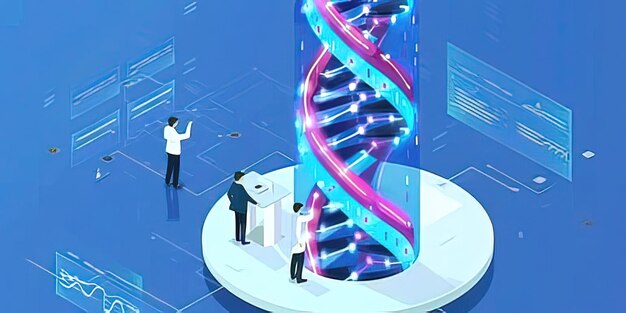Exploring the Ethical Dilemmas of Gene Editing: A New Frontier in Human Genomics Research
Gene editing, a revolutionary technique that allows scientists to manipulate an organism’s DNA, has opened up new possibilities in the field of human genomic research. With the advent of CRISPR-Cas9 technology, gene editing has become more accessible and precise than ever before. However, this new frontier comes with a host of ethical dilemmas that need to be addressed.
The Morality of Designer Babies
One of the most contentious ethical issues surrounding gene editing is the creation of “designer babies.” With the ability to edit genes that determine traits such as intelligence, physical appearance, and disease resistance, some fear that parents will use this technology to create “perfect” children. This raises questions about the morality of playing God with human life and whether we are opening a Pandora’s box that could lead to societal discrimination and inequality.
The Ethics of Gene Therapy
Gene therapy, another application of gene editing, holds great promise for treating genetic disorders. However, it also raises ethical concerns. For instance, should parents have the right to edit their child’s genes to prevent or cure a disease? What about adults who wish to undergo gene therapy for cosmetic purposes or to enhance their physical or cognitive abilities? These questions touch on issues of autonomy, consent, and the potential for unintended consequences.
The Slippery Slope of Eugenics
Another ethical dilemma related to gene editing is the risk of rekindling the eugenics movement. The historical use of eugenics, which involved selective breeding and forced sterilization of individuals deemed “unfit” or “defective,” is a dark chapter in human history. Gene editing could potentially be used to create a “master race” or to eliminate certain traits that are deemed undesirable by society. It is essential that we learn from the past and ensure that gene editing does not lead us down a similar path.
The Role of Regulation
Given the ethical dilemmas surrounding gene editing, it is crucial that we establish a regulatory framework to guide its use. This includes setting guidelines for research and clinical applications, ensuring informed consent and transparency, and addressing potential societal consequences. Governments, ethical bodies, and scientific communities must work together to strike a balance between technological progress and ethical considerations.
Conclusion
Gene editing represents a new frontier in human genomic research, but it also poses significant ethical challenges. As we continue to explore the possibilities of this technology, it is essential that we engage in an open and inclusive dialogue about its potential consequences and implications. By addressing these ethical dilemmas, we can ensure that gene editing is used responsibly and ethically to improve human health and well-being.
References
[1] National Human Genome Research Institute. Gene Editing: What You Need to Know. link
[2] International Summit on Human Gene Editing. Summary Report. link

Gene Editing: Advancements, Ethics, and Implications
Introduction
Gene editing refers to deliberate modifications of an organism’s DNA sequence. This groundbreaking technology, which has been undergoing rapid advancements, offers the potential to cure genetic disorders, improve food production, and even enhance human capabilities. In recent years, gene editing has gained significant attention in both scientific research and societal discourse due to its transformative implications. However, as the possibilities of this technology expand, so do the ethical dilemmas that come with it.
Advancements in Human Genomics Research
The CRISPR-Cas9 system, a widely used gene editing tool, has revolutionized the field of genetics. Discovered in 2012 and first used for gene editing in humans in 2019, CRISPR allows precise modifications to the DNA sequence, enabling researchers to target specific genes and make desired changes. This technology holds immense promise in the medical realm for treating inherited conditions such as sickle cell disease and cystic fibrosis, as well as cancer treatments and potential life extension.
Importance of the Topic
The implications of gene editing are far-reaching, touching on various aspects of our lives. From a scientific perspective, gene editing holds the potential to cure genetic disorders and even eradicate certain diseases. Ethically, however, it raises questions about human identity, eugenics, and the potential for creating “designer babies.” From a societal standpoint, gene editing introduces concerns surrounding access to this technology, its impact on social structures, and the role of governments and regulatory bodies in overseeing its application.
Preview of Ethical Dilemmas
As gene editing moves beyond the realm of scientific research and into broader application, it is essential to address the ethical dilemmas that come with this technology. These include:
- Genetic Equity: How do we ensure access to gene editing for all individuals, regardless of socioeconomic status or geographic location?
- Eugenics and Human Identity: What are the potential consequences of creating “designer babies” or enhancing human capabilities?
- Regulation and Oversight: How do we ensure that gene editing is used responsibly and ethically, with appropriate regulatory frameworks in place?
- Long-term Health and Environmental Impacts: What are the potential risks associated with widespread gene editing, including unintended consequences or long-term health effects?

